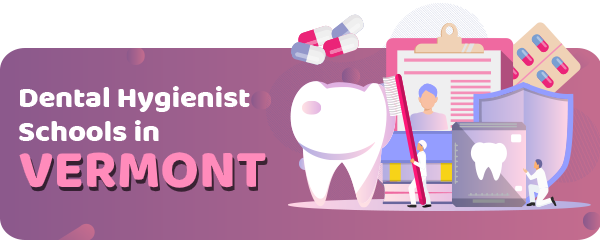Getting your dental hygiene license in Vermont requires some specific steps.
This article will shed some light on how to start working in the field, so read on.
Article Table of Contents
Educational Requirements
In this state, dental hygiene licenses are offered by The Vermont Board of Dental Examiners.
The first step is enrolling in a school that is accredited by the Commission on Dental Accreditation (CODA) on the American Dental Association (ADA).
Vermont requires the completion of an at least 2-year program on dental hygiene.
This typically results in an associate’s degree.
However, you can choose to pursue higher education like a bachelor’s degree for increased work opportunities.
Some of the classes you will attend during your program include:
- Anatomy and physiology
- Nutrition
- Clinical dental hygiene
- Microbiology, pharmacology, and general pathology
- Radiology
- Dental materials
- Periodontics
- Bioethics
- Chemistry and mathematics
- Community oral health
If you plan on working with local anesthesia, make sure that the program you attend has a course on it.
You can also choose to get a certification as an Expanded Function Dental Assistant if you attend a related course.
| School Name | Address |
|---|---|
| Vermont Technical College | 1 Main Street, Randolph Center, Vermont 05061-0500 |
Take the Required Exams
You will need to pass some exams before you can get your dental hygiene license.
NBDHE
The first of these is the National Board Dental Hygiene Examination (NBDHE), provided by the Joint Commission on National Dental Examinations (JCNDE).
This test has 350 questions on:
- Patient assessments
- Xrays
- Professional responsibility
- Supportive treatment
- Use of preventative agents
- Performance of periodontal procedures
- Management and planning of dental care
- Community health and research
- Science of dental hygiene
This exam with national recognition costs $400.
Clinical Exam
The second exam is clinical and will assess how well you can perform your job duties.
The exam is provided by the following:
- Commission on Dental Competency Assessments
- Central Regional Dental Testing Service
Applying for a Dental Hygienist License
To apply, you must meet the below criteria:
- Have a current CPR certification
- Pass the Jurisprudence exam in Vermont
- Send in NBDHE test results
- Clinical exam results
- Dental hygiene school transcripts
- 2 recommendation letters from practicing dentists
- Fill in an application form
- Pay the licensing fee
All the documents must be mailed to the Board.
If you also want to get a local anesthesia permit, you need to follow the below guidelines:
- Have completed a course during your dental hygiene program
- Take a 24-hour class approved by the CODA
License by Credentials
If you have a license in another state, you don’t need to take an exam in Vermont.
However, you need to submit the following documents:
- Proof of 5-year experience as a dental hygienist
- 100 days or 800 hours of on-job experience over the last 5 years
Expected Salary
Those with extra permits will earn a higher salary than the average dental hygienist salary shown below.
Annual Salary Range:| Location | Avg. Annual Salary |
|---|---|
| Burlington | $73,754 |
| Essex | $73,754 |
| South Burlington | $73,754 |
| Colchester | $73,754 |
| Rutland | $73,416 |
| Bennington | $75,774 |
| Brattleboro | $75,926 |
| Milton | $73,709 |
| Essex Junction | $73,754 |
| Hartford | $76,773 |
Regional Salary in Vermont
| Region | Employed | Avg. Annual Salary | Avg. Hourly Pay | Top 10% Annual Salary | Bottom 10% Annual Salary |
|---|---|---|---|---|---|
| Burlington-South Burlington, VT | 270 | $93,740 | $45.07 | $96,640 | $86,750 |
* Employment conditions in your area may vary.
Maintaining the License
To keep your dental hygiene up to date, you need to renew it every 2 years.
You will also have to attend 18 extra hours of education before applying for renewal.
Read the full guide: How to Become a Dental Hygienist
